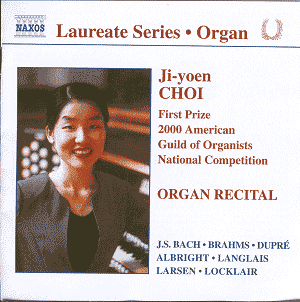The young organist Ji-yeon Choi chooses cannily. From
Bach to Libby Larsen via Brahms, Dupré and Langlais, Choi takes
in masterpieces of the repertoire as well as intriguing and challenging
new works. Her three part voicing in the opening Bach Prelude is worthy
of note, albeit I find the pedal note worryingly unpleasant, and maybe
her tempo in the succeeding Fugue is too slow, blunting the fugal entries,
which sound correspondingly diffused. I enjoyed the elfin registrations
of the andante of Bachís magnificent Sonata in E minor, which is sensitively
done, and which sounds more glass harmonica than organ. Albrightís three
pieces from his Organbook date from 1977. The Jig, a Dance of Death,
is predominately staccato, virtuosically frantic, remorseless and black
hued. The following Nocturne, by contrast, is crepuscular, magically
still and shimmering and excellently played. The Finale, called The
Offering, is a something of a cluster study, a raucous Messiaen-influenced
piece of high spirits tinged with intimations of unhinged activity.
Brahmsí Fugue is an early work, written when he was
twenty-two. As his English follower, Hubert Parry, was later to do,
Brahms extends his formal fugal textures into freer, more romantic,
writing. Even then his technical mastery is everywhere evident. The
slow, reflective conclusion is the work of a confidence born of expertise.
By contrast Langlaisí riotous Fete is a jubilant, celebratory work,
as befits its title. Its jauntiness is succeeded by a more meditative
section before Langlaisís frisky Fete
Ends gloriously. Choi is alive to Libby Larsenís 1990
Tambourines. Beginning at 2.45 Larsen writes an attractive central passage,
tonal, rhythmic, before a grand, rhetorical almost unresolved conclusion.
Dan Locklairís 1984 Ayre opens with a rocking, insistent nasal motif
Ė the registration emphasises the slightly sinister air Ė a second cousin
of Boogie Woogie. His flourishes and vampish roulades are an amusing
sideshow of this wholly engaging and clever little piece. Dupreís Variations
sur un Noel dates from 1922. Its technical complexities embrace canons,
a devilish fugue, a carillon, much use of colour, tempo changes and
dance themes of real complexity. A piece of subtle beauty and animation
it receives from Choi a good performance Ė though her Vivace in the
Fifth Variation is more humorous than rapid.
A wide-ranging programme then and generally good performances.
Others may well disagree but I found the organ sound distinctly off-putting.
Naxos doesnít, unfortunately, print its specifications but itís less
than pleasant. Decent notes.
Jonathan Woolf

![]() Ji-yeon Choi organ
Ji-yeon Choi organ ![]() NAXOS 8.555367
[63.04]
NAXOS 8.555367
[63.04]